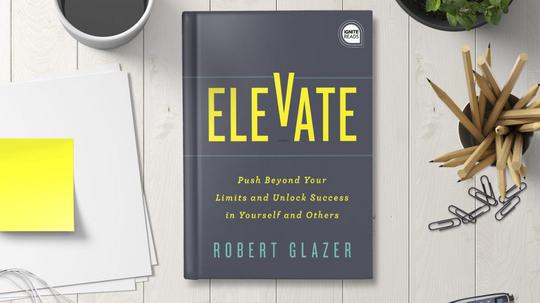
It was only in 2016 that Robert Glazer decided to write an email to his employees at Acceleration Partners about how to set goals for the new year. At the time, Acceleration Partners, a Needham-based digital marketing firm, employed about 30 people, and Glazer was not yet a thought leader in his field.
The email would change everything for Glazer.
Within three years, that internal email, which Glazer dubbed "Friday Inspiration," would transform into a newsletter with an international following and some 100,000 subscribers, as Business Insider reported in January. The newsletter now bears the name "Friday Forward." It contains linked inspirational articles and thinkpieces alongside insights from Glazer himself. Tomorrow's newsletter will be Friday Forward #193.
The insights from that email, and the responses Glazer received from readers across the globe, set off a new wave of inspiration inside Glazer. Recently, he sat down to write a book. Meant to be read in under an hour—so readers could digest it in bits and pieces on their commutes, from their beds, wherever they might be—"Elevate: Push Beyond Your Limits and Unlock Success in Yourself and Others" builds on ideas highlighted in Friday Forward and presents a new framework: "capacity-building." As Glazer sees it, capacity-building is not a new term for optimization, but rather a way for people to fully actualize their own abilities.
"Elevate" will be released Oct. 1 by Sourcebooks. Glazer will be at Wellesley Books on Oct. 7 to talk about the book and sign copies.
BostInno caught up with Glazer over the phone to talk about capacity-building, "Elevate" and how he ensures his actions are aligned with his core values.
You describe these ideas as beliefs you've held for years and years. What made you decide to write everything down in a book?
I started Friday Forward as just an email to my team that sort of took off, to the point where I had strangers from all around the world signing up and writing me notes and thanking me for whatever I wrote that week. They said they were doing stuff and making improvements. I went to write a compilation of these messages and then realized, in talking to someone, that there was probably a bigger story. I'm someone who needs framework. I sat down, and I said, "Okay, what is it that we've done to help build people and build leaders in our company? And what is it about these messages that seem to be resonating with people?" I organized them thematically, and I talked to a lot of people.
What came out of this process illuminated the framework of capacity-building. It was a pattern I was seeing over and over again, particularly in both what we use as a leadership development strategy and what I saw from really high achievers. I think, with a lot of things, once you start writing, it illuminates your own thinking. A lot of times, you get to the right place by bumping off the wall and bumping off the wall. But once you actually know what you're doing, it tends to take it to another level.
I think we have this belief that more is more, rather than the right things are more.
Yeah, totally. I have been familiar with that, believe me.
A lot of the things we do, a lot of us know when we run into a core value violation. It just doesn't feel right. We kind of bounce of the wall repeatedly, but once you have it clear and you know your lane, you get there much faster. You don't have to take a lot of wrong turns.
I wonder if you can think of a time when you realized that the thing you were doing, or a habit you had, was not aligned with your core values, and you had to make a change.
Part of my desire to sort of improve is to join different organizations. There were a couple organizations I was on, even nonprofits, where my participation didn't either fulfill anything for me or change anything for them. The actual work they needed was not the best use of my ability. I started undoing a lot of those things. I think we have this belief that more is more, rather than the right things are more. For me, I actually started to undo a bunch of things, whether that was certain relationships, certain commitments.
Part of it is just saying no to hard things and having to really quit stuff to open space for me to do more of the stuff I liked to do. Stuff I'd just be doing late at night, even if no one paid me to do it—like writing the Friday Forward email.
It sounds almost like a quality versus quantity problem.
Yeah, it's all quantity. We all have 24 hours in the day. One of the articles I wrote last year that went really viral, which surprised me, was "When People Ask How You Are, Stop Saying 'Busy.'" We all get 24 hours. That's not an answer. I think some people are just super laser-focused on first of all, what they want, then how they're going to get there, and what they're not going to do. They separate urgent versus important. You see these themes over and over again. When you see this person who is accomplishing so much, I think we tend to look and say, "What do they have that I don't have? What are they doing that I don't have?" I don't think of anything comparatively. I actually think they've become the best version of themselves. A lot of us have not gotten out of our own way to do that.
You use the term "capacity-building." For me, it almost flashes a little light bulb in my head—it aligns with a lot of the recent writing about optimizing your time. But then, if you'll bear with me for a moment, there has been backlash against the idea of optimization. Like, you don't have to optimize all your time, all the time. I think the backlash is toward the idea that you constantly have to be productive. Where do you think that the concept of capacity-building fits into that conversation?
For me, capacity-building is your ability to improve at something that you want to do. Optimization—I could optimize something that I don't want to be dealing with, that I don't want to do. Think about physical capacity. We understand that if I lift a weight for 14 days, then I will be able to, with the same or less energy, lift more weight at the end of those 14 days. We understand that linear line. I don't think we understand it that much in the other realms of intellectual, emotional and physical health. When you are stressed out, when you let your health go to crap, it makes everything you do harder. I think of an analogy about a processor. When you upgrade the processor or the operating system, it does things better, faster and cheaper than before.
If you and I get into a difficult discussion at 9 o'clock, and by 9:15, I'm onto the rest of my day and crushing it, and you are replaying this thing in your head and can't get it out of your head and don't get anything done all day, this to me is a misconception. We have the same 12 hours in the day. It's just that I had upgraded my capacity to handle a difficult conversation, and you did not. Therefore, your eight hours of the day look very different from my eight hours.
I do wonder, though—I mean, there are certain segments of the population, like a parent with a two-month-old child who is getting basically no sleep, who doesn't have the capacity they normally would to handle a difficult conversation. Or somebody who has an anxiety disorder. Or somebody who's having problems at home. Do you think your framework can apply to those people as well?
I think the framework applies to everyone. Some people will have natural handicaps. Look, if you get into a terrible accident, your physical capacities will be diminished. It kind of makes the other ones more important.You've seen people who have a physical thing and who are really negative and down, and how does their recovery look versus someone who's positive and optimistic? The parent one is interesting, because I've had this debate with people in my company, specifically about a morning routine. I said, "Let me ask you, how is that working out for you, for your kid to be your alarm clock in the morning, and the first thing that happens is your kid comes and yells at you to get out of bed? Are you the best parent and person?" They might not have an hour to do a morning routine. But if you know that your kids wake up at 5:45 every day, try going to bed 15 minutes early. Set the clock at 5:30, get up, refresh, have some coffee, look out the window. You'll be a very different person when they come running down.
We can always make these general excuses around things. And there's some real, legitimate things that happen to people, either life stage or accident or otherwise. But I think sometimes, we tend to throw the baby out with the bathwater. Like, "I could not possibly have a morning routine because I have a child." That's not true. We can choose to hide behind that. But I could probably point you to thousands of people, who are doing incredible stuff, for whom that's not true.
In your book, you talked about a couple of different inspiring figures. Sheryl Sandberg, Warren Buffett, the inventor of the growth mindset Carol Dweck. What would you say are some of your top inspirations when you're thinking about developing this framework?
The job of anyone who finds something and is writing from it is to bring it together in a different way. I try to give everyone credit who influenced "Elevate." It is a product of a lot of different ideas. For me, though, like you said a lightbulb went off, when I get a framework around something that provides a clear roadmap for what I'm doing or what I want to do and how I want to think about it, that's when the magic happens. That's what I'm hoping will be helpful to other people. When they're reading that book, I want them to be like, "I knew all this stuff. The author just laid it out in a way that allows me to use it and access it in a different way."








